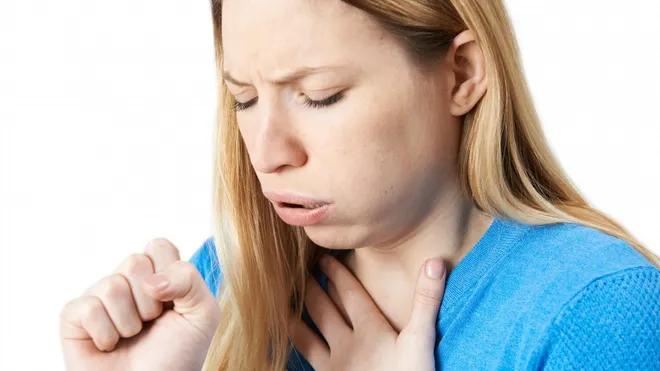A cough is a symptom and a reflex action of the human body to remove mucus, dangerous substances and infections from the respiratory tract. A cough is a major symptom of whooping cough, causing the classic whooping sound. This can keep you awake at night causing disruption and frustration, leading to tiredness during the day. Lets take a look at ways you can relieve night time coughing. Before we do that lets refresh our knowledge on what whooping cough is, its causes and symptoms.
📝 What is whooping cough?
Whooping cough is a bacterial infection named after the sound of someone taking a deep breath after a fit of coughing. The bacteria that cause whooping cough, Bordetella pertussis, spreads very easily through close contact and can sometimes cause serious illness.
The bacterial cells enter the upper respiratory tract and attach to ciliated cells and start to produce toxins. The toxins damage airways, rapidly reproducing, causing swollen airways and increased mucus production. This extra mucus leads to coughing and coughing periods of increased intensity. Symptoms worsen and the bacteria continues to be passed on to other people through respiratory droplets in the air from sneezing, coughing or when talking.
📊 Symptoms of whooping cough
Whooping cough symptoms typically progress in three phases:
- The incubation stage resembles cold-like symptoms such as a runny nose, sneezing, mild fever and an occasional cough lasting around two weeks
- The paroxysmal stage is more severe with fits of rapid coughing lasting over a week, vomiting during and after coughing fits, exhaustion during coughing fits and a low grade fever. Young babies may experience apnea (stop breathing) or cyanosis (a bluish skin colour) during coughing fits. In adolescents and adults, the symptoms are generally worse at night
- The third stage of whooping cough is the convalescent stage, which may last for several weeks. There is a gradual improvement in coughing fits and severity. The cough becomes milder and less frequent. Coughing fits may stop for a while, but they can return when you get another respiratory infection
😴 How to stop whooping cough at night?
Change sleeping position
Avoid laying flat on your back as this may cause mucus to accumulate in your throat, triggering a coughing fit. Keep your head and neck elevated instead by using pillows to create a surface to rest your head and neck on. You could also incline your mattress.
Improve quality of bedroom air
By investing in a humidifier for the bedroom you can improve the quality of the air. A humidifier adds moisture by releasing water vapour or steam into the air to prevent dry air which can irritate your body.
Remove irritants
Keeping the home free of pollutants that might trigger a coughing episode is important to stop a cough. Irritants include:
- Mould can irritate the throat and airways. Mould can grow in damp areas of your home, releasing spores into the air. Inhalation of these spores can worsen respiratory issues
- Pet dander can irritate coughs. Tiny pieces of skin shed by cats, dogs and other pets can become airborne and contribute to poor indoor air quality
- Smoke from cigarettes or wood-burning stoves can lead to coughing bouts
- Dust mites thrive in warm, humid environments and are common allergens. Their waste products can become airborne and aggravate respiratory problems. Regular cleaning of bedding is important
- Strong odours from cleaning products. Chemicals that evaporate into the air from household products like paints, varnishes, cleaners, or perfumes may also trigger a coughing spell
Stay hydrated
Drinking lots of fluids keeps mucus thin and easier to expel from the body. Herbal teas with lemon and honey not only hydrate but also soothe sore throats.
❗People most at risk of severe complications
People at greatest risk from whooping cough infection include:
- Infants under one year old. Serious complications can be life-threatening for young children aged less than 6 months old
- Pregnant women, especially those in the third trimester
- People that have chronic respiratory system illnesses and other health conditions
📈 Complications of whooping cough
- Infants may have a pause in their breathing (apnea), dehydration, pneumonia or seizures
- Older children and adults may develop sore ribs, a hernia, middle ear infections or urinary incontinence
- Brain damage from lack of oxygen is rare but is possible. Most at risk are sick babies younger than 6 months
📝 How can I protect myself and my child from whooping cough?
Vaccination is the most effective way to protect yourself. Immunity decreases over time, therefore boosters are required. The whooping cough vaccine or pertussis vaccine is recommended by the NHS for:
- Babies at 8, 12 and 16 weeks of age, who receive the 6-in-1 vaccine. Vaccination also protects against diphtheria, tetanus, polio, Hib (Haemophilus influenzae type b) and hepatitis B. Vaccinating your child at the right time gives important protection during this vulnerable time
- Children aged 3 years 4 months of age, who receive the 4-in-1 pre-school booster
- Pregnant women should receive the vaccine at around 20 weeks into their pregnancy to help protect the baby for the first few weeks of their life. Antibodies are transferred through the placenta, providing short term protection until the baby can receive their own vaccine
It’s important to remember the vaccine isn’t just to protect yourself, but to protect individuals around you that might be at high risk for getting sick.
💊 Treatment
Antibiotic treatment is the main treatment for whooping cough to help prevent the bacteria spreading to others and to reduce symptoms. Over the counter medication such as paracetamol and ibuprofen can help reduce high temperatures.
Other measures that can help include:
- Drinking lots of fluids
- Plenty of rest to conserve energy between coughing spells
- Small frequent meals to avoid vomiting
- Avoiding taking cold and cough medicines, unless prescribed by a healthcare professional
📝 Conclusion
You may be able to ease your whooping cough at night by trying some changes such as adjusting your sleeping position, improving the air quality in your bedroom and removing irritants. Complete your course of antibiotics, even if your symptoms improve and go back to the doctor if any medications seem to make the cough worse. If your symptoms last longer than a few weeks or your symptoms worsen, consult with a healthcare professional for medical advice.
Sources
- Whooping cough – NHS
- Whooping cough – Symptoms & causes – Mayo Clinic
- Whooping Cough (Pertussis): Causes, Symptoms & Prevention
- Whooping cough – Health topics A to Z -CKS – NICE
- Pertussis (Whooping Cough) – Whooping Cough – CDC
Medical Disclaimer
NowPatient has taken all reasonable steps to ensure that all material is factually accurate, complete, and current. However, the knowledge and experience of a qualified healthcare professional should always be sought after instead of using the information on this page. Before taking any drug, you should always speak to your doctor or another qualified healthcare provider.
The information provided here about medications is subject to change and is not meant to include all uses, precautions, warnings, directions, drug interactions, allergic reactions, or negative effects. The absence of warnings or other information for a particular medication does not imply that the medication or medication combination is appropriate for all patients or for all possible purposes.








